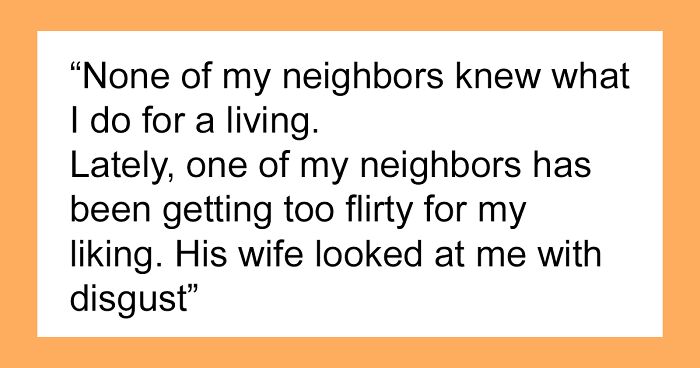
“They Both Looked At Me With Disgust”: Delusional Neighbor Keyed Author’s Car Over Erotic Books, So She Called The Police
Having good relationships with your neighbors sounds like a blessing, doesn’t it? Ideally, you have friendly chitchats with them, host cookouts in your backyard, and trust them enough to look after your valuables while enjoying a well-deserved break. But the reality is far more complex, and many of us have at least one troubling story to share about the folks who live just a few steps away from us.
And Redditor Interesting-Reply118 is one of them. This single woman in her early 30s opened up about a recent neighborhood dispute she found herself in because people were displeased with her life choices. You see, the user makes a living out of writing and self-publishing adult fiction but keeps her career on the down-low.
One couple who lives right next door, Roger and Dalia, managed to uncover her secret. But instead of acting like mature adults and showing respect for the woman’s decisions, they decided to take a different path. Below, you can read how the whole story unfolded, as well as some responses from members of the “Am I The A-Hole” community. So continue scrolling and be sure to weigh in on the situation in the comments!
Recently, this author found herself in a troubling dispute after a neighbor keyed her car over the books she writes
Image credits: Liza Summer
To learn more about negative relationships between neighbors and how we could turn them around, we reached out to Jaap Nieuwenhuis, assistant professor of sociology at the University of Groningen, the Netherlands. According to him, it can be hard to steer clear of having disputes with people living next door. “If you don’t like someone in school or at work, it is rather easy to avoid that person, or at least minimize the amount of contact with that person. Within a neighborhood, and especially within a densely populated neighborhood, it is very difficult to avoid your neighbors,” he told Bored Panda.
Unhealthy arguments often occur when there’s a clash between their life choices. “Many people are attached to their own specific lifestyle … [and] when someone else infringes on your ability to enjoy your own lifestyle, conflict can emerge.”
One of the biggest and most common problems is that different ways of living cannot always be enjoyed simultaneously. Take noise, for example. “Enjoying a late-night outdoors party with loud music may be fun for one, but might not be for the next person, who is anyway forced to listen to it.”
“Other common conflicts are also about how to deal with (public) space in a way that is acceptable for everyone. This is seen, for instance, in complaints about children, pets, inconveniently parked cars, verbal violence, and conflict about garden borders,” Nieuwenhuis added.
Wondering if she went too far, the woman turned to the AITA community to ask for advice
Image credits: awar kurdish
When asked why some people next door take drastic measures such as keying the car to criticize neighbors’ decisions, the professor believes these incidents are quite rare. While his research mainly focuses on the Netherlands, he explained that many issues between neighbors seem to be resolved by simply talking with each other. “My guess is that neighbors are more likely to be willing to talk to each other about problems they might have when the neighborhood is an open, pleasant, and safe environment.”
In places where social cohesion is already strong, people are more likely to confront others when their behavior does not follow certain norms, he argued. Moreover, they often adhere to such norms because they know that neighbors might come to have a chat about it if they don’t. “One such norm might be to not turn on the volume of your music too loud, especially when it’s late in the evening,” Nieuwenhuis explained.
Speaking of the Redditor’s incident, Nieuwenhuis mentioned we lack some details about the incident, but this vandalism might have followed from years of built-up tension about unresolved conflicts between those two neighbors. “A much earlier intervention in that relationship that was turning sour could potentially have avoided this outcome,” he guessed.
Fostering positive relationships in the community is extremely important, and we’re well aware that creating a sense of well-being is key to a happy neighborhood. However, this may be hard to achieve when fewer people are taking the time to engage with their neighbors. In 2020, an insurance comparison site The Zebraconducted a survey that revealed a lot of work needs to be done when it comes to getting to know people down the street. Their findings show that only 33% of Americans consider their neighbors as friends or close friends, and 66% see them as strangers or acquaintances.
When people don’t know their neighbors’ names and don’t engage in conversations with them, it could influence negative attitudes towards them. Although Nieuwenhuis noted that would only be the case when they already have problems with noise, the use of public spaces, or something else. When no such annoyances exist, “Not knowing your neighbors may not really impact negative attitudes, and people are able to live peacefully side by side.”
Still, getting to know each other has plenty of benefits and can create a welcoming atmosphere in the community, he told us. “I don’t necessarily mean meeting daily for coffee, but at least greeting each other when passing on the street. In a situation like that, if there arises a conflict between neighbors, it is probably more easily/quickly resolved than in a neighborhood where nobody knows each other at all.”
Here’s how Redditors reacted to this whole situation
According to the professor, positive social relationships usually emerge in places where people already trust and like each other. “This may sound like circular reasoning because you might ask how would you reach such a state of positive relationships in the first place,” he said. Nieuwenhuis pointed out that we need several conditions to create environments where people can engage in positive relationships.
The first one is safety. When neighborhoods are unsafe, people may try to avoid communicating with their neighbors, and parents may restrict their kids’ outdoor activities, Nieuwenhuis argued. “In such a situation, social relationships are less likely, and social cohesion is lower. As described above, this may be a breeding ground for conflict.”
Another condition is having more meeting spaces and a shared goal in the community. “For meeting places, think about a community center, but also (safe) outdoors spaces, such as a walkable shopping area and a square. For shared goals, think about taking care of a community garden, organizing a yearly neighborhood block party, volunteering, and organizing activities at the community center.” Nieuwenhuis explained that finding more opportunities to meet can foster positive relationships and social cohesion in the neighborhood. So remember, dear readers, a quick ‘How do you do?’ the next time you see your next-door neighbor can make a big difference.
119Kviews
Share on FacebookOr Roger isnt. Possibly one or both may be pretty bad at it If everyone could have a good scrogfest once in a while, there would be alot less bad c**p happening in the world.
Load More Replies...Some of these are so obvious, you basically have to ask "Why would you ever think YOU were the a*****e, OP?"
Load More Replies...I am so sick of people who don't like something, disagree over things or have different opinions getting pissy and doing stuff like that. Agree to disagree be respectful and move on. For goodness sake why is it that everyone who gets offended over some c**p has to lash out, damage property, slander and just be a big butt hole. Respect their lives and choices and go about your business
And if the person's views are that repulsive, don't talk to them unless absolutely necessary. For example, I cut off a former friend who doubled down on bigotry. Their other friends can do what they want. I'd certainly call for help and do CPR on my former friend if they dropped half-dead half-way through a racist rant.
Load More Replies...Funny how some religious citizens so easily resort to violence to make their delusional point...
I just had an argument about this very thing a few days ago with someone who was calling out someone else, saying they need to "find Jesus". It amazes me how it always seems that the zealots who constantly preach to everyone else about how they should live a pious life, never seem to live it themselves. Some are just flat out evil. I consider myself a Christian, but more and more, I can't stand how often supposed Christians will do crazy, hurtful things to others and then try to say it's in the name of God. I'll take an atheist who lives a good life and helps others any day over a Christian who just pretends to do it on Sundays.
Load More Replies...Half these "am I the a*****e" stories sound fake as hell, who would ever think they were the a*****e in this scenario when they were the person being harassed and having their property destroyed by some weirdo that can't mind their own business
I don't know about fake, but the point of those threads was for people who really weren't sure about themselves. But posts like this are more like people who either want to brag or vent. I agree, I don't see any way that this person actually considers they were wrong here especially since the only they "consider" it is because of just one talk they had with someone else that's barely mentioned.
Load More Replies...its clear the husband found out about it and he was pissed her husband liked it, so she took it out on her, if it was "so bad" then why did she let her husband read it in the first place? she clearly knew he did since he would talk about it to his friends in front of her and only got p*ssed when the "author " was the naighbor
What I want to know is who told these neighbors what she wrote. She doesn’t use her real name, so if hubby came across one of her books he wouldn’t make the connection. Wonder if the other neighbor who thinks Dalia is lovely is the one who ratted her out, and is trying to keep her part of the blame on the down low. Hmmm…
I think someone needs to ask why they're so upset about these books and their content. If being exopsed to it "makes you it", then everyone who read Oscar Wilde for college lit classes would be gay, we'd all be impoverished idiots like Dickens, we'd all be Mormons like the woman who wrote Twilight.... Yeah, see how that works? If you don't like it? Don't read it, and move along to wholesome stuff like Disney, where there's evil stepmothers and poisonings of stepchildren and villains always falling off cliffs....
They're offended by the existence of sex for pleasure. These people think it only exists for baby-making/submitting to your husband.
Load More Replies...Dalia is nuts crazy. In a very short period of time her husband will cheat on her.
You may be right. If something so trivial has caused her to be so emotionally unstable, out of touch with reality, and blame the author of a book for her perceived indiscretions of her husband, instead of dealing with the issues that they do have, that have nothing to do with the author of a book her husband was reading. She seems like she was looking for a reason to pick a fight with someone about anyway. She was probably a very unpleasant person to be around already. She sounds like she has some weird hang ups and insecurities. She may drive people away from her with her restrictions and negative behaviors.
Load More Replies...If Dalia was more concerned about Roger enjoying himself than with him being a creep, those two have problems. Good on the OP for installing security cameras. Shame on the neighbor who is oblivious to Dalia's inappropriate behaviors and thinks she's lovely. Also, the sound of keying a car* is horrendous and I could hear that from reading this. * I've never done that, but someone in my neighborhood keyed my brother's car. The person who did that said that my brother was going to Hell for his disturbing behaviors. My brother has schizoaffective disorder with delusions and at the time had an incorrect diagnosis. Sorry for the overload of personal information, but I can't stand people like this.
Talking behind her back, then leaflets, then vandalism, what's next, cutting her brake lines, getting someone to assault her?
Im from the most atheistic country and these religious gobbledegooks have never understand. Whats wrong with adult literature? It can be art or tacky at the most. And I always get upset about "she is good mother" and such creepy invective person mixing. An absolute awful and abusive person can present himself as pretty charmant at public and nobody believes he has treated his children with extraordinary cruelty. If we can recognize criminals before, the world might go very easy...
Are there really so many nutty people out there? This one was more than obvious but really: how can people be so deranged?
It is scary and extremely disturbing how many nut jobs are actually out there. Some people are very good at hiding it- which is even scarier to me.
Load More Replies...The leaflets? Harmless. The looks of disgust? Pointless. Destruction of property is not. Hope the t*ss*r husband goes for the conjugal visits while she's in jail.
BP is censoring the word t osser now? I had to write it like that to keep it from being censored.
Load More Replies...Ah, yes, Christian "love" at its finest! The world would be a much better place if religious people learned to mind their own business.
Ah, yes, the best way to convert someone to Christianity is to berate, judge, etc. them. Typical to blame other women for one's husband's decisions and shortcomings.
Not only would I have called the police, "Dalia" would have paid for the new paint job.
What in the nine hecks did I just read. Seriously what does the neighbor(not arrested) think should happen. What am I allowed to defecate on your driveway as long as I clean it up by the end of the day. I mean how many days is op expected to drop her car off for repainting, new tires, broken windows etc. She did this twice. Once may be your drunk and angry the second time your a bully. Sounds like Dahlia needs to find the AITA post about the guy who divorced his wife for cheating because she red Fabio covered novels to get interested in he intimacy. Sounds like these two would make a great couple
Better in hell with the demons than with the a🍄🍇🐙🍎🍋e Dalia in heaven.
Ok, maybe I'm an idiot, bit what do the pictographs mean?
Load More Replies...Neighbours sound slightly unhinged. Who behaves like that? If Dalia's a christian I think she missed out on the new testament.
I think what I would do is buy a house in the country and get away from creepy neighbors on both side of your house. One that damages your property and one that thinks she is a nice person. And the one that does the damage has a husband that would probably like to do more than read your books. Get out while you can.
I would keep an eye on her from all the action she has taken and how it's escalated ....if F. B.I. were to profile her this woman is headed for a break that may end up bloody...just saying
too many women are so insecure and terrified they aren't enough for their husbands they fear anything they consider "rivalry". I am an 80+ year single woman and women I have known for over 60 years are terrified of leaving me in a room in their home with their husbands or in some instances introducing me to their husbands. Its insane.
"AITA for calling the police and not giving Dalia a chance?" What - a chance to do more damage?? This is not a teenager with parents who will ground them and cut off their allowance. The adult harasser and vandal was counting on no one calling the cops and treating her like an adult.
Nta but you should have responded with Satanic leaflets. And for Halloween demonic whores abound in your yard with hell brothel theme.
I think the OP needs to write an erotic novel about a s3xually frustrated christian girl who is desperate for some, and takes out her frustration keying cars and spraypainting insults on her pretty neighbour's door. And then post a copy to the offending couple. with asterisks saying "based on true story" and "names have been changed".
I hear Dalia is running for Congress now, based on her "victimhood." I doubt I have to tell you which party.
I'm a professional reader and I chose what is offered to me. I read romance (among other categories) from clean to otherwise not very clean. I'm still a Christian. Doesn't mean I masturbate while I'm reading; some do I don't and I don't care if they do. Just leave me alone with my choice of reading. The thing with reading so many books (+300/year) like I do is that I need to write the review right away otherwise ask me tomorrow what the book was about and I don't remember. That lady went overboard. Will she have the same reaction for a club bouncer where people dance and drink? What about a sleezy car seller? Correction officer? Sexologist? I was a NFP expert in the past and I talked about sex and breastfeeding all the time because my office was at home; same when I was a midwife. Did that make me a bad person with bad job choices? Nope. Get over it; it's not your life.
This has got to be fake. No one in their right mind would have to ask if they were the a*****e or not. Very obviously NTA, and I think whoever wrote this knows that.
That's why i avoid living in muslim countries. That religious fanatism is too much for me.
What the hell ? How is this even a question ... what's next for AITA? AITA for quietly suggesting my boss stop smashing in my windows at work and stealing from my car? AITA for asking my neighbor to stop putting their dog's poop in my mailbox? AITA for having my friend arrested for drowning my infant in their bathtub? This couldn't have be a serious question & just done for attention & clicks.
Or Roger isnt. Possibly one or both may be pretty bad at it If everyone could have a good scrogfest once in a while, there would be alot less bad c**p happening in the world.
Load More Replies...Some of these are so obvious, you basically have to ask "Why would you ever think YOU were the a*****e, OP?"
Load More Replies...I am so sick of people who don't like something, disagree over things or have different opinions getting pissy and doing stuff like that. Agree to disagree be respectful and move on. For goodness sake why is it that everyone who gets offended over some c**p has to lash out, damage property, slander and just be a big butt hole. Respect their lives and choices and go about your business
And if the person's views are that repulsive, don't talk to them unless absolutely necessary. For example, I cut off a former friend who doubled down on bigotry. Their other friends can do what they want. I'd certainly call for help and do CPR on my former friend if they dropped half-dead half-way through a racist rant.
Load More Replies...Funny how some religious citizens so easily resort to violence to make their delusional point...
I just had an argument about this very thing a few days ago with someone who was calling out someone else, saying they need to "find Jesus". It amazes me how it always seems that the zealots who constantly preach to everyone else about how they should live a pious life, never seem to live it themselves. Some are just flat out evil. I consider myself a Christian, but more and more, I can't stand how often supposed Christians will do crazy, hurtful things to others and then try to say it's in the name of God. I'll take an atheist who lives a good life and helps others any day over a Christian who just pretends to do it on Sundays.
Load More Replies...Half these "am I the a*****e" stories sound fake as hell, who would ever think they were the a*****e in this scenario when they were the person being harassed and having their property destroyed by some weirdo that can't mind their own business
I don't know about fake, but the point of those threads was for people who really weren't sure about themselves. But posts like this are more like people who either want to brag or vent. I agree, I don't see any way that this person actually considers they were wrong here especially since the only they "consider" it is because of just one talk they had with someone else that's barely mentioned.
Load More Replies...its clear the husband found out about it and he was pissed her husband liked it, so she took it out on her, if it was "so bad" then why did she let her husband read it in the first place? she clearly knew he did since he would talk about it to his friends in front of her and only got p*ssed when the "author " was the naighbor
What I want to know is who told these neighbors what she wrote. She doesn’t use her real name, so if hubby came across one of her books he wouldn’t make the connection. Wonder if the other neighbor who thinks Dalia is lovely is the one who ratted her out, and is trying to keep her part of the blame on the down low. Hmmm…
I think someone needs to ask why they're so upset about these books and their content. If being exopsed to it "makes you it", then everyone who read Oscar Wilde for college lit classes would be gay, we'd all be impoverished idiots like Dickens, we'd all be Mormons like the woman who wrote Twilight.... Yeah, see how that works? If you don't like it? Don't read it, and move along to wholesome stuff like Disney, where there's evil stepmothers and poisonings of stepchildren and villains always falling off cliffs....
They're offended by the existence of sex for pleasure. These people think it only exists for baby-making/submitting to your husband.
Load More Replies...Dalia is nuts crazy. In a very short period of time her husband will cheat on her.
You may be right. If something so trivial has caused her to be so emotionally unstable, out of touch with reality, and blame the author of a book for her perceived indiscretions of her husband, instead of dealing with the issues that they do have, that have nothing to do with the author of a book her husband was reading. She seems like she was looking for a reason to pick a fight with someone about anyway. She was probably a very unpleasant person to be around already. She sounds like she has some weird hang ups and insecurities. She may drive people away from her with her restrictions and negative behaviors.
Load More Replies...If Dalia was more concerned about Roger enjoying himself than with him being a creep, those two have problems. Good on the OP for installing security cameras. Shame on the neighbor who is oblivious to Dalia's inappropriate behaviors and thinks she's lovely. Also, the sound of keying a car* is horrendous and I could hear that from reading this. * I've never done that, but someone in my neighborhood keyed my brother's car. The person who did that said that my brother was going to Hell for his disturbing behaviors. My brother has schizoaffective disorder with delusions and at the time had an incorrect diagnosis. Sorry for the overload of personal information, but I can't stand people like this.
Talking behind her back, then leaflets, then vandalism, what's next, cutting her brake lines, getting someone to assault her?
Im from the most atheistic country and these religious gobbledegooks have never understand. Whats wrong with adult literature? It can be art or tacky at the most. And I always get upset about "she is good mother" and such creepy invective person mixing. An absolute awful and abusive person can present himself as pretty charmant at public and nobody believes he has treated his children with extraordinary cruelty. If we can recognize criminals before, the world might go very easy...
Are there really so many nutty people out there? This one was more than obvious but really: how can people be so deranged?
It is scary and extremely disturbing how many nut jobs are actually out there. Some people are very good at hiding it- which is even scarier to me.
Load More Replies...The leaflets? Harmless. The looks of disgust? Pointless. Destruction of property is not. Hope the t*ss*r husband goes for the conjugal visits while she's in jail.
BP is censoring the word t osser now? I had to write it like that to keep it from being censored.
Load More Replies...Ah, yes, Christian "love" at its finest! The world would be a much better place if religious people learned to mind their own business.
Ah, yes, the best way to convert someone to Christianity is to berate, judge, etc. them. Typical to blame other women for one's husband's decisions and shortcomings.
Not only would I have called the police, "Dalia" would have paid for the new paint job.
What in the nine hecks did I just read. Seriously what does the neighbor(not arrested) think should happen. What am I allowed to defecate on your driveway as long as I clean it up by the end of the day. I mean how many days is op expected to drop her car off for repainting, new tires, broken windows etc. She did this twice. Once may be your drunk and angry the second time your a bully. Sounds like Dahlia needs to find the AITA post about the guy who divorced his wife for cheating because she red Fabio covered novels to get interested in he intimacy. Sounds like these two would make a great couple
Better in hell with the demons than with the a🍄🍇🐙🍎🍋e Dalia in heaven.
Ok, maybe I'm an idiot, bit what do the pictographs mean?
Load More Replies...Neighbours sound slightly unhinged. Who behaves like that? If Dalia's a christian I think she missed out on the new testament.
I think what I would do is buy a house in the country and get away from creepy neighbors on both side of your house. One that damages your property and one that thinks she is a nice person. And the one that does the damage has a husband that would probably like to do more than read your books. Get out while you can.
I would keep an eye on her from all the action she has taken and how it's escalated ....if F. B.I. were to profile her this woman is headed for a break that may end up bloody...just saying
too many women are so insecure and terrified they aren't enough for their husbands they fear anything they consider "rivalry". I am an 80+ year single woman and women I have known for over 60 years are terrified of leaving me in a room in their home with their husbands or in some instances introducing me to their husbands. Its insane.
"AITA for calling the police and not giving Dalia a chance?" What - a chance to do more damage?? This is not a teenager with parents who will ground them and cut off their allowance. The adult harasser and vandal was counting on no one calling the cops and treating her like an adult.
Nta but you should have responded with Satanic leaflets. And for Halloween demonic whores abound in your yard with hell brothel theme.
I think the OP needs to write an erotic novel about a s3xually frustrated christian girl who is desperate for some, and takes out her frustration keying cars and spraypainting insults on her pretty neighbour's door. And then post a copy to the offending couple. with asterisks saying "based on true story" and "names have been changed".
I hear Dalia is running for Congress now, based on her "victimhood." I doubt I have to tell you which party.
I'm a professional reader and I chose what is offered to me. I read romance (among other categories) from clean to otherwise not very clean. I'm still a Christian. Doesn't mean I masturbate while I'm reading; some do I don't and I don't care if they do. Just leave me alone with my choice of reading. The thing with reading so many books (+300/year) like I do is that I need to write the review right away otherwise ask me tomorrow what the book was about and I don't remember. That lady went overboard. Will she have the same reaction for a club bouncer where people dance and drink? What about a sleezy car seller? Correction officer? Sexologist? I was a NFP expert in the past and I talked about sex and breastfeeding all the time because my office was at home; same when I was a midwife. Did that make me a bad person with bad job choices? Nope. Get over it; it's not your life.
This has got to be fake. No one in their right mind would have to ask if they were the a*****e or not. Very obviously NTA, and I think whoever wrote this knows that.
That's why i avoid living in muslim countries. That religious fanatism is too much for me.
What the hell ? How is this even a question ... what's next for AITA? AITA for quietly suggesting my boss stop smashing in my windows at work and stealing from my car? AITA for asking my neighbor to stop putting their dog's poop in my mailbox? AITA for having my friend arrested for drowning my infant in their bathtub? This couldn't have be a serious question & just done for attention & clicks.

 Dark Mode
Dark Mode 

 No fees, cancel anytime
No fees, cancel anytime 




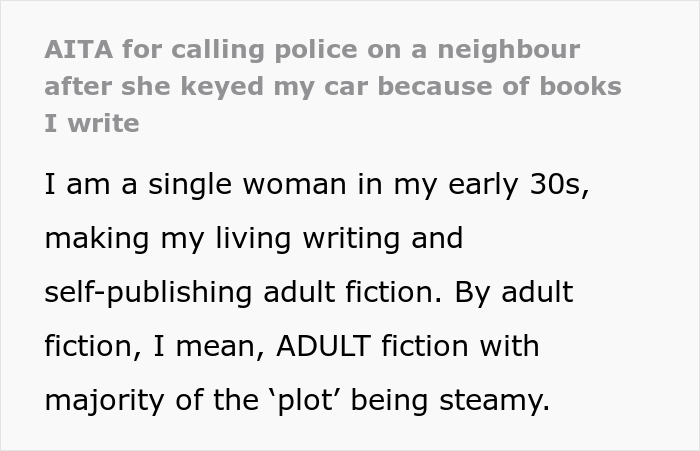


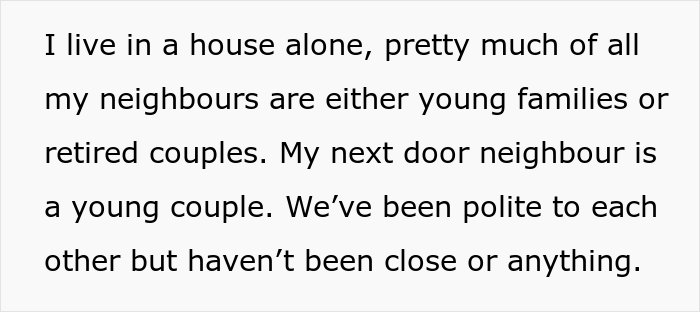




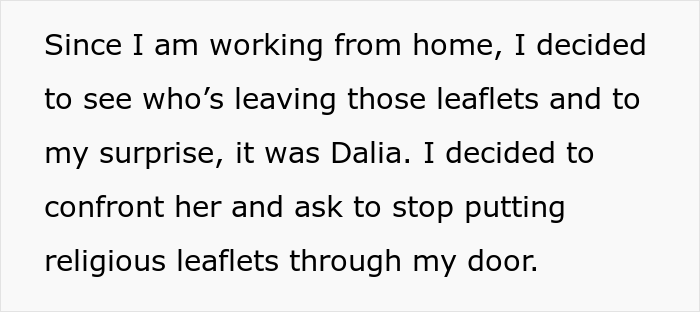




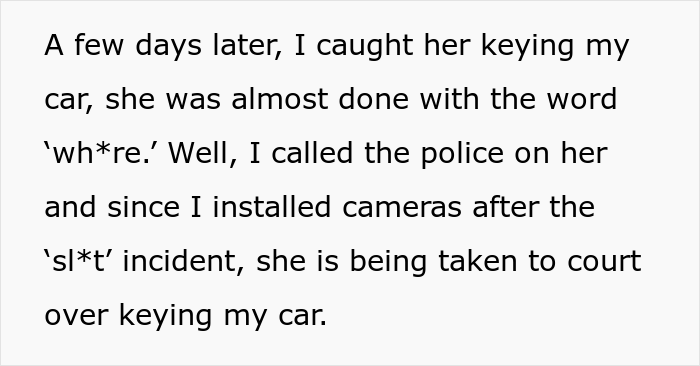
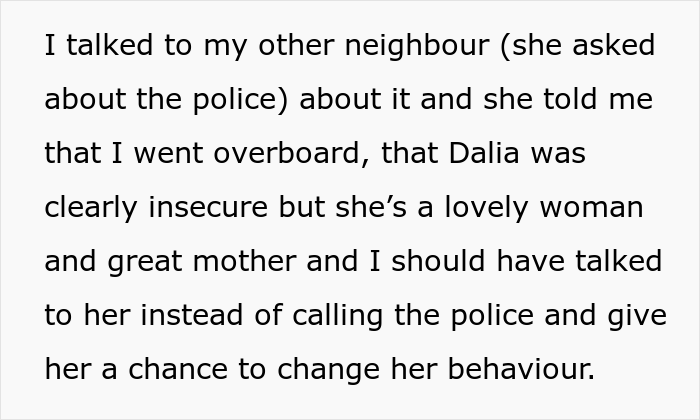


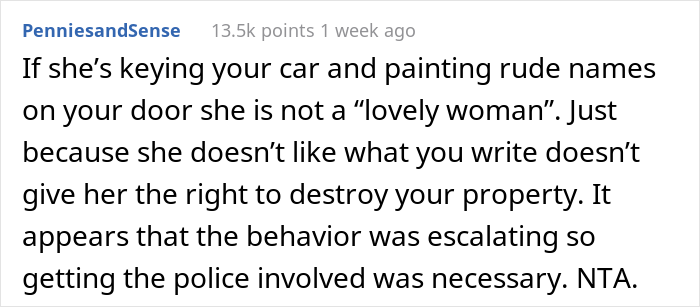
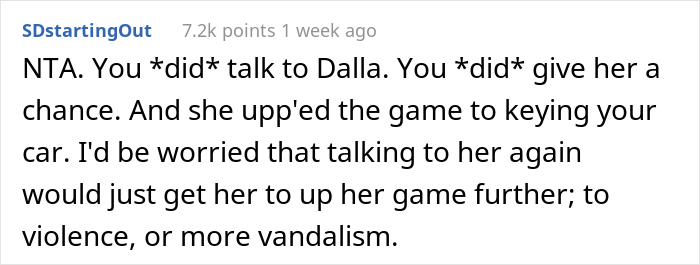

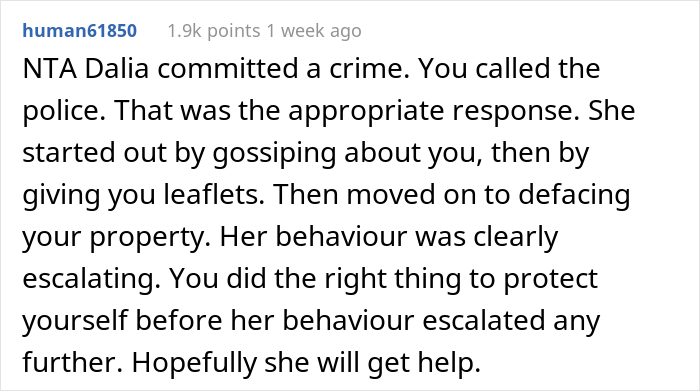
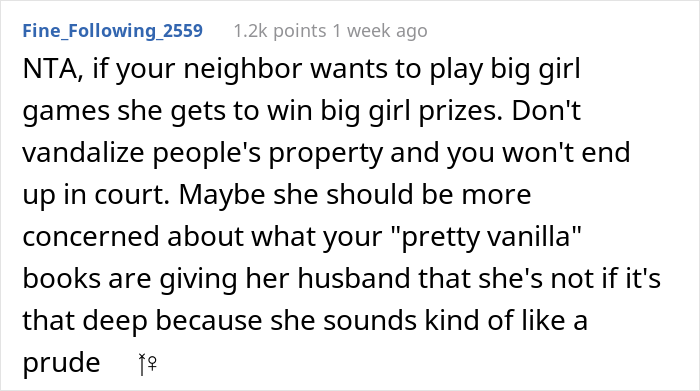










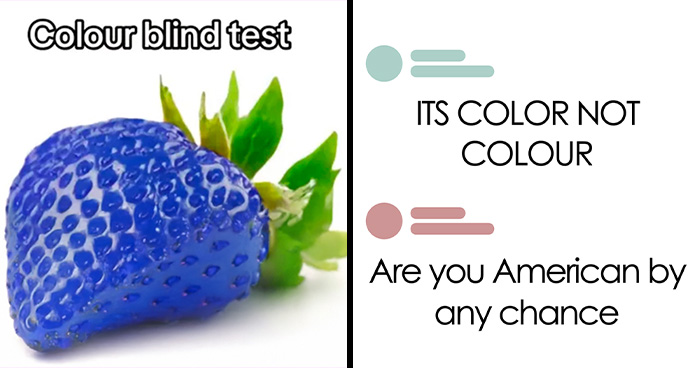


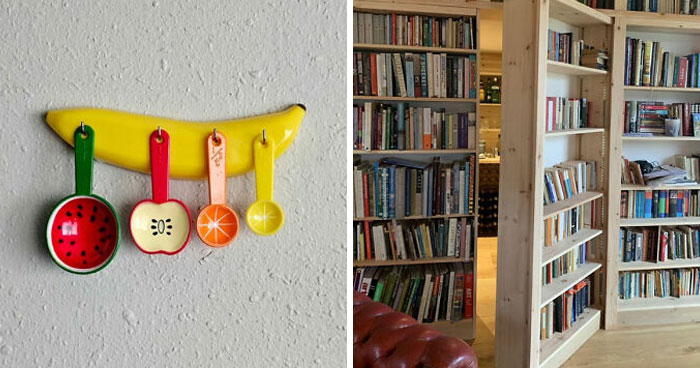
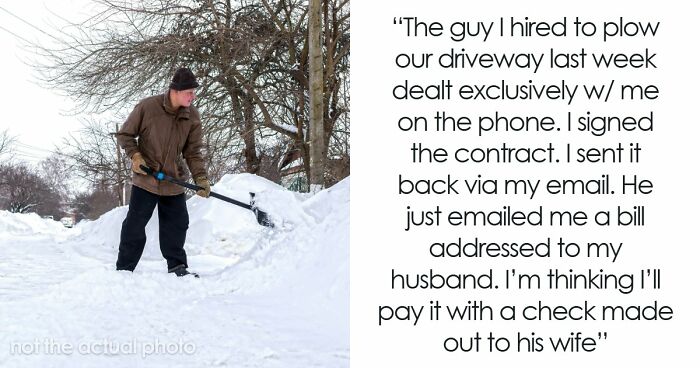









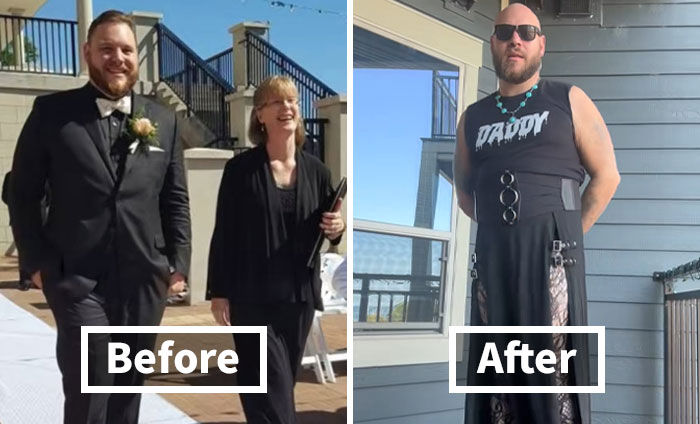


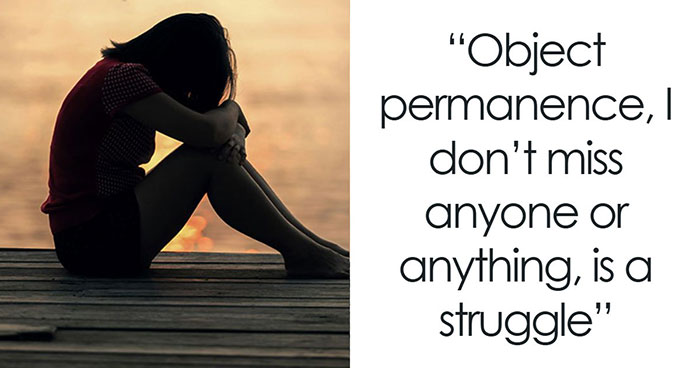










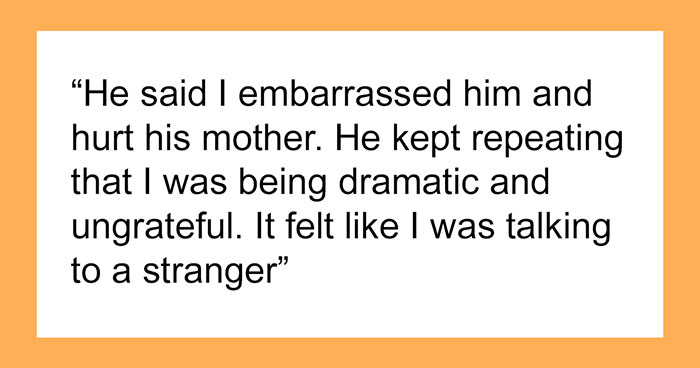

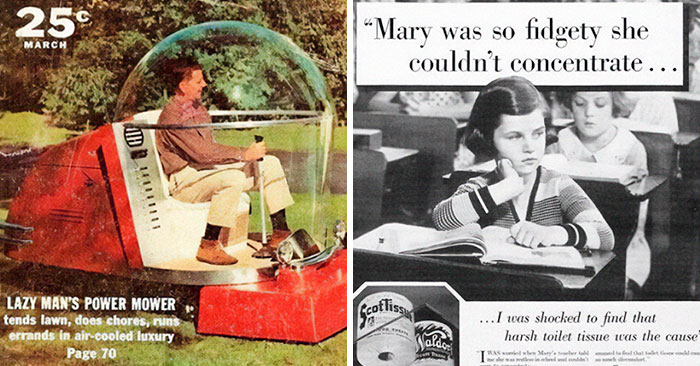

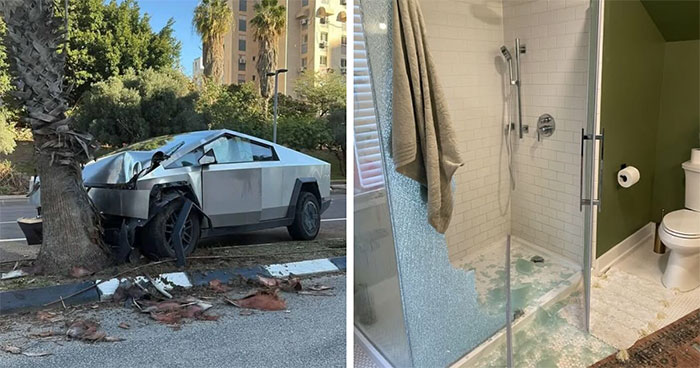



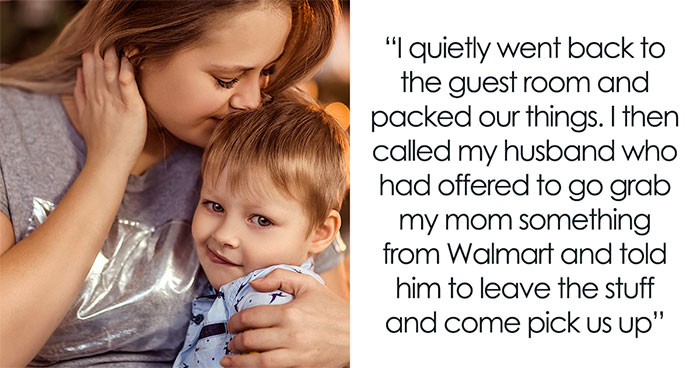


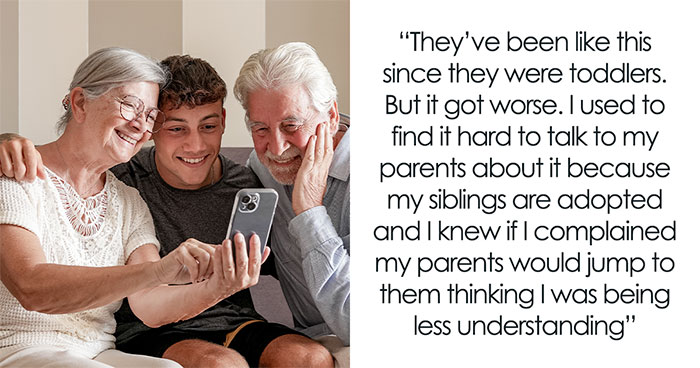
164
91